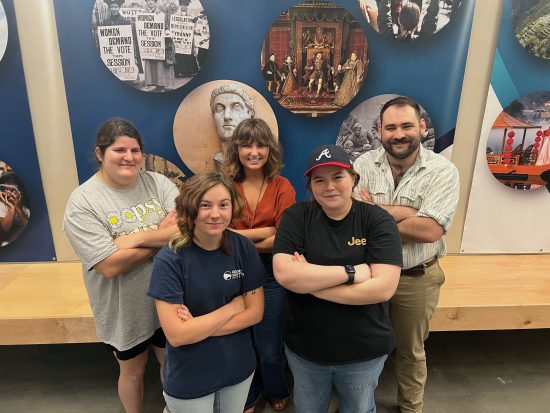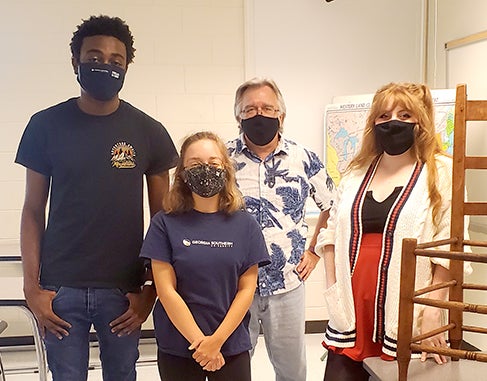Graduate Course Offerings
The Department’s faculty members teach courses covering various time periods, regions of the world, and themes in history. The course schedules below show what has been offered in past semesters, the current semester, and what is tentatively expected to be offered in future semesters. For the current semester, you can also visit the Registrar’s Schedule of Classes and search for ‘HIST’ in the subject area. Future semester schedules are subject to change in order to fit the needs of the department, and may be revised without advance notice. No contract, either expressly or implied, is created by future schedules. Course Descriptions can be found in the catalog.
| Spring 2024 | |
| Statesboro | |
| HIST 5210 G | Advanced Topics in Public History |
| HIST 5251 G | Museum Studies |
| HIST 5254 G | Oral History |
| HIST 7631 | Readings in American History |
| HIST 7633 | Readings in European History |
Student Success Resources
The following are a collection of links to resources that the department believes will be of significant benefit to history majors or anyone taking an upper division history course. For success, a history major should be familiar with all of these in some form.
- Georgia Southern University Writing Center
- Purdue Online Writing Lab: Developing a thesis statement
- The Writing Center of the University of Wisconsin – Madison: Conducting research, organizing material, and writing a research paper
- University of Maryland: Online guide to writing and research
- Purdue Online Writing Lab: General information and tips on writing, including grammar, punctuation, citation, different types of writing and other writing-related topics
- Turabian Quick Guide: The official University of Chicago Press short guide to citation according the rules found in Kate L. Turabian’s Manual for Writers of Research Papers, Theses, and Dissertations.
- Formal vs Informal Writing: Brief guide for students to help them differentiate writing styles for assignments.
- Zotero: The official site for downloading Zotero, a Firefox add-on that enables you to collect, organize, and cite (in Microsoft Word) bibliography found on the internet, whether from library catalogues, journal databases, or even Amazon. The site also includes tutorials—look under “documentation.”
- The C.R.A.P. Test: a guide to determining the Currency, Reliability, Authority, and Purpose of online sources.
- Online tutorial for JSTOR: Video tutorial for using JSTOR to find academic articles.
- Online tutorial for Project Muse: An online tutorial for using Project Muse to find academic articles.
- The National University Library System: Links to tutorials and other information on JSTOR, Project Muse, and other academic databases.
The History Lab at Georgia Southern is an experimental space for developing projects and installations related to historical research, which recognize the challenges of understanding and valuing history and historical methods in the digital age. The goal of the lab is to open the traditional classroom to the kinds of effects achieved in creative and cross-media knowledge spaces and to develop a model that can be replicated on a small scale with limited funding.
Projects like True/False: The Indigo Garden, The Waddie Welcome Archive, and Open Sea: Reflections from a Port City are currently being incubated in the lab. Student and faculty projects using WordPress blogging, Wiki sites, Google Maps and other widely available and public domain software applications are also facilitated and hosted through the lab.
The lab is also collecting of video recordings of interviews with local public artists and historians. These interviews are archived through streaming video to build up a database of localized practices of public history.
Below are several rubrics that will assist you while enrolled/completing the Methods and Senior Seminar courses.
- Citation-Bibliography Rubric for Historical Methods and Senior Seminar.
- Title Page for Papers (HIST 2630 and HIST 4635)
- Portfolio Review Rubric to assess the portfolio each student must submit for graduation.


